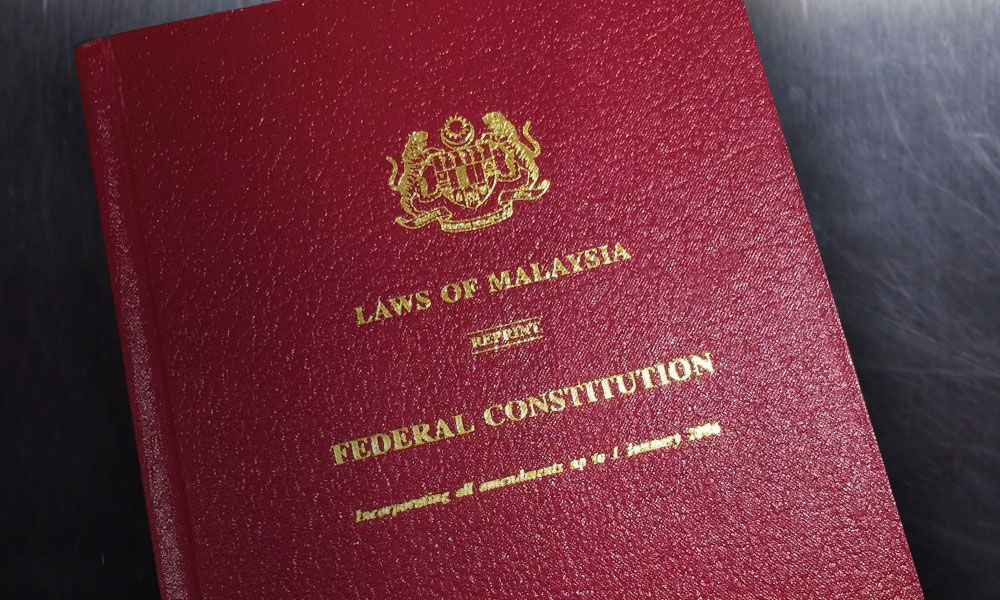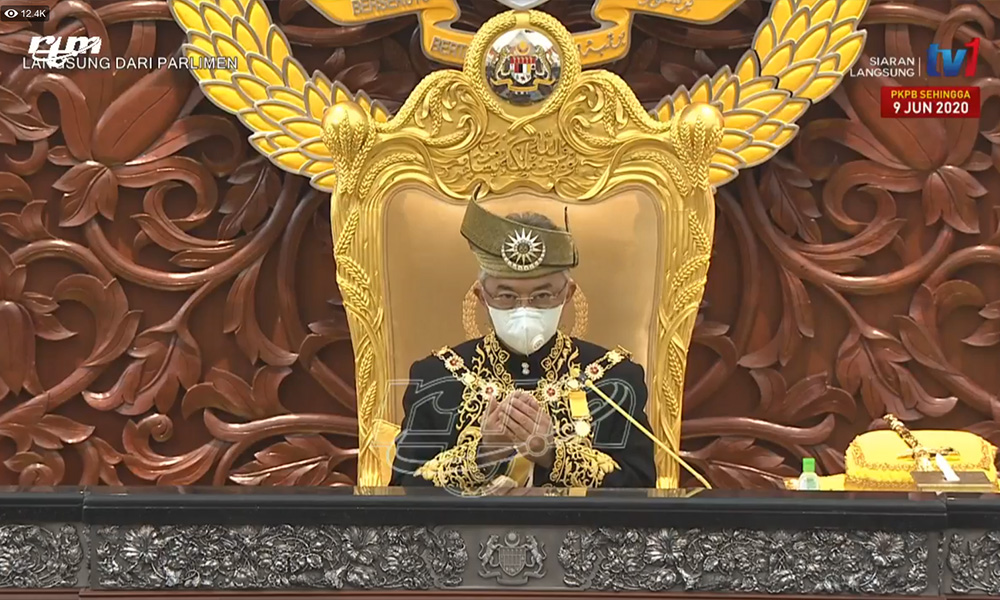One of the most basic and fundamental principles undergirding the Federal Constitution is that of the practice of constitutional monarchism. As a learned and respected law professor had once written, the king reigns but does not rule. In exercising most, though not all, of the functions of the Yang di-Pertuan Agong, he acts on advice, and must follow the advice that has been rendered to him.
The learned attorney-general is therefore absolutely correct to refer to Article 40(1) of the Federal Constitution in helping us to understand the interplay between the reign of the Agong on the one hand, and the rule of the government of the day on the other. To quote:
“In the exercise of his functions under this Constitution or federal law the Yang di-Pertuan Agong shall act in accordance with the advice of the cabinet or of a minister acting under the general authority of the cabinet, except as otherwise provided by this Constitution….”
This is a provision that has been in the Federal Constitution since 1957, and represents the way in which a constitutional monarchy is intended to work.
Just in case the meaning and intent of Article 40(1) are not clear to anyone, Article 40(1A) was inserted in effect from June 24, 1994. The learned attorney-general has also correctly referred to this:
“In the exercise of his functions under this Constitution or federal law, where the Yang di-Pertuan Agong is to act in accordance with advice, on advice, or after considering advice, the Yang di-Pertuan Agong shall accept and act in accordance with such advice.
We should recall the environment existing at the time this amendment was made. Between 1993 and 1994, the government of the day led by Dr Mahathir Mohamed introduced several amendments to the Federal Constitution to restrict the power of the Agong. Lest there be any ambiguity, Article 40(1A) was inserted to ensure that the Agong not only received advice, but actually accepted and acted in accordance with the advice of the cabinet, and had no alternative.
However, what the learned attorney-general did not go on to say was that the Federal Constitution does provide for another person or body of persons to advise the Agong. Under Article 40(3):
“Federal law may make provision for requiring the Yang di-Pertuan Agong to act after consultation with or on the recommendation of any person or body of persons other than the cabinet in the exercise of any of his functions other than — (a) functions exercisable in his discretion; (b) functions with respect to the exercise of which provision is made in any other Article.”

This is mentioned not simply for the sake of being complete. This is where we need to refer to the Emergency (Essential Powers) Ordinance 2021 (EO). It should be recalled that, in the preamble to the EO, it is stated that:
“Whereas by reason of the existence of a grave emergency threatening the security, economic life and public order of the Federation arising from the epidemic of an infectious disease, namely Coronavirus Disease 2019 (Covid-19), a Proclamation of Emergency has been issued by the Yang di-Pertuan Agong under Article 150 of the Federal Constitution on this eleventh day of January, 2021:
And whereas the Yang di-Pertuan Agong is satisfied that immediate action is required to guarantee and preserve the security, economic life and public order:
It is hereby promulgated an ordinance by the Yang di-Pertuan Agong pursuant to Clause (2B) of Article 150 of the Federal Constitution as follows:...”.
The preamble makes it absolutely clear that the reason for the Proclamation of Emergency and promulgation of the EO is solely because of Covid-19.
Now, Section 2(1) of the EO states:
“There shall be established an independent special committee to advise the Yang di-Pertuan Agong on the continuing existence of the grave emergency threatening the security, economic life and public order of the Federation arising from the epidemic of an infectious disease, namely Coronavirus Disease 2019 (Covid-19).”
This section was no doubt included in the EO to introduce an element of political impartiality and independence, meaning to say that any decision in relation to the state of Covid-19 in Malaysia would not be made by a politically partisan body, but by an Independent Special Committee (ISC). As can be seen, the role of the ISC is to advise the Agong on whether Covid-19 continues to constitute a “grave emergency threatening the security, economic life and public order of the Federation”.
Which in turn would necessitate the continuation of the state of emergency as well as the various provisions of the EO including whether or not Parliament and the State Legislative Assemblies should remain suspended.
We know from a subsequent announcement that the ISC is chaired by a former chief justice of the Federal Court, and has 18 other members including a former chief secretary to the government, a former inspector-general of police, a former chief of the Armed Forces, a former director-general of Health, seven other individuals including an academic, medical personnel, a former prosecutor, a chamber of commerce representative, a state mufti and a former state secretary, and seven sitting members of Parliament – four from the government benches and three from the opposition benches. Semenanjung Malaysia, Sabah and Sarawak are represented. There has not been much public information about the workings of this ISC.
It is my contention that by virtue of Section 2 of the EO, read together with Article 40(3) of the Federal Constitution, the advice that the Agong must accept and act in accordance with is that of the ISC and no longer that of the cabinet. Even in the case of sittings of Parliament and of the various State Legislative Assemblies, since their suspension was directly as a result of the EO, their reopening would depend on the advice rendered by the ISC to the Agong.
It is not clear what advice has or has not been rendered by the ISC to the Agong, if any. What we do know is that in the press statement issued by Istana Negara on June 16, 2021, Istana Negara stated the following (in Bahasa Malaysia):
“Setelah memperhalusi semua pandangan para pemimpin parti politik, Jawatankuasa Khas Bebas Darurat 2021 dan sembah taklimat para pakar dari agensi-agensi Kerajaan maka Seri Paduka Baginda menzahirkan pandangan bahawa persidangan Parlimen perlu diadakan secepat mungkin. Ini untuk membolehkan Ordinan-ordinan Darurat dan Pelan Pemulihan Negara dibahaskan oleh Ahli-ahli Dewan Rakyat.”
What the statement from Istana Negara makes clear is that the Agong has heard the views of, among others, the ISC. And after hearing from them, and from others, the Agong expressed the view that a sitting of Parliament should be convened as soon as possible.
There are those who argue that the expression of views by members of the ISC should not be equated with the formal advice intended to be rendered by the ISC to the Agong pursuant to Section 2 of the EO. This may well be correct.
However, the counter-argument is that would the Agong have expressed his views to have Parliament re-opened as soon as possible if the views of the members of the ISC who met with him were to the contrary?
It would be entering into the realm of speculation to discuss the nature of the view or views that might have been expressed by members of the ISC who met with the Agong, and whether they did so in their personal or official capacity, and I do not propose to do so.
What is nevertheless clear is that the provisions of Article 55 of the Federal Constitution on the summoning, prorogation and dissolution of Parliament are not to apply, pursuant to Section 14(1)(a) of the EO.
Section 14(1)(b) of the EO states that “Parliament shall be summoned, prorogued and dissolved on a date as the Yang di-Pertuan Agong thinks appropriate”. But the provision of Section 14(1)(b) of the EO must be read in conjunction and be consistent with Article 40 of the Federal Constitution.
However, the operative provision of Article 40 in this situation may not be clauses 1 or 1A but clause 3 instead. Which means to say that the future of our parliamentary democracy lies in the hands of 17 men and two women who are members of the ISC. - Mkini
ANDREW KHOO is a legal practitioner. He is co-chair of the Bar Council Constitutional Law Committee, but writes here in his personal capacity.
The views expressed here are those of the author/contributor and do not necessarily represent the views of MMKtT.





No comments:
Post a Comment
Note: Only a member of this blog may post a comment.